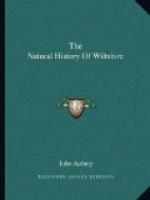[This account of the " bedlam beggars” so well known to our forefathers, is repeated by Aubrey in his “Remains of Gentilism,” (Lansdowne MSS. No. 231,) portions of which have been printed in Mr. Thoms’s Anecdotes and Traditions (1839). The passage corresponding with the above is quoted by Mr. Charles Knight from the manuscript referred to, in illustration of the character of “Mad Tom,” assumed by Edgar, in Shakspere’s play of King Lear.- J. B.]
PART II. — CHAPTER V.
Arts: LIBERALL and MECHANICK.
Cricklad, a market and borough town in this county, was an University before the Conquest, where were taught the liberall arts and sciences, as may appeare by the learned notes of Mr. Jo. Selden on Drayton’s Poly-Olbion, and by a more convincing and undenyable argument out of Wheelock’s translation of Bede’s History.
This University was translated from hence to Oxford. But whereas writers swallow down the old storie that this place takes its name from certain Greek philosophers, who, they say, began here an university, it is a fond opinion.
[Aubrey here quotes Fuller as to the etymology of the names of Cricklade and Lechlade. That author, on the authority of Leland, had asserted in his Church History that the one was originally called Greek — lade, and the other Latin — lade, from “two schooles, famous both for eloquence and learning”, which existed there anterior to the Conquest. But, on the report of his “worthy friend Dr. Peter Heylin,” he afterwards stated in his Worthies that “Cricklade was the place for the professors of Greek; Lechlade for physick (Leech being an old English word for a physitian), and Latton, a small village hard by, the place where Latin was professed.” It will be seen by the next sentence that Aubrey disputes even the amended theory of Fuller, and, with more probability, derives the names of the towns in question from words indicating the natural features of the localities.-J. B.]
But, as the saying is, “Bernardus non vidit
omnia”. Had the learned Dr. Heylin (that
is Hoelin, little Howell) had a little knowledge of
his ancestors’ Welsh, he would not have made
such a stumble, and so forced these etymologies;
but would easily have found that Cricklad comes from
kerig, stones; and glad, a country; which two words
give a true description of the nature of the country
on that side of Cricklad, which is, as wee term it,
a stone-brash. Likewise Lechlade, from llech,
plank-stones, or tile-stones. As for Latton, it
may very well come from laith, which signifies a
marsh, and is as much as to say Marshton, as there
is a parish thereby called Marston. Hereabout
are some few other places which retain their British
names with a little disguise.
___________________________________
Without the close of Salisbury, as one comes to the town from Harnham-bridge, opposite to the hospitall, is a hop-yard, with a fair high stone wall about it, and the ruines of an old pidgeon house. I doe remember, 1642, and since, more ruines there. This was Collegium de Valle Scholarum (College de Vaux). It took its name from Vaux, a family. Here was likewise a magister scholarum, and it was in the nature of an university. It was never an endowed college. (From Seth Ward, Bishop of Sarum.)




